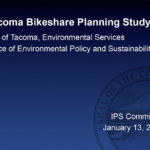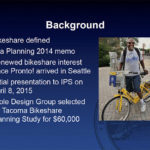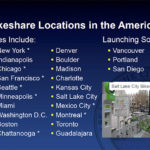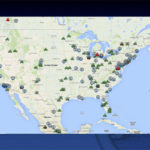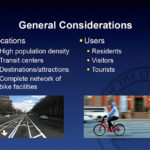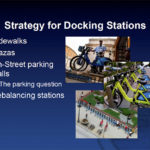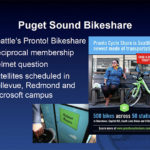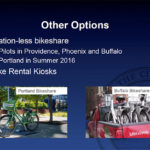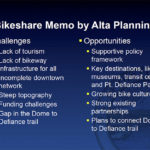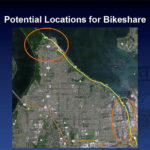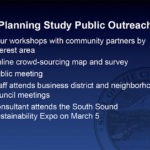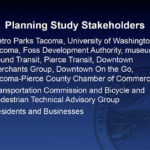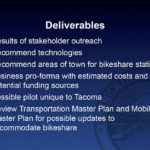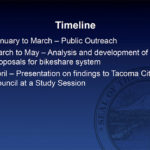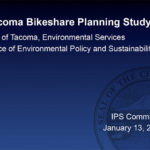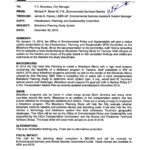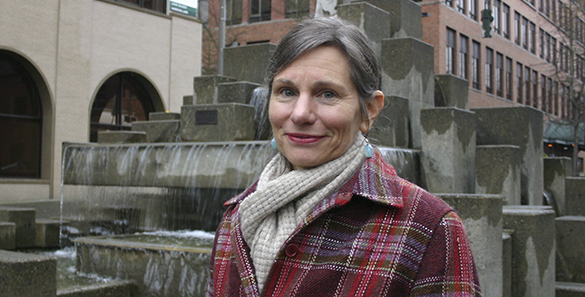Imagine cycling along Five Mile Drive at Point Defiance Park or getting off a bus at Tacoma Dome Station and cycling into the city center — all without owning a bicycle. These are some of the ideas being explored as part of a study under way to determine whether to create a bikeshare program in Tacoma.
Bikeshare allows people to check out bicycles for short trips around the city. Locally, the City of Seattle partnered with Pronto Cycle Share to roll out a bikeshare system in October of 2014 that includes 500 bikes and 50 stations throughout the city. It hasn’t been an easy ride. Last week, The Seattle Times reported Seattle’s bikeshare program was ‘teetering’ on insolvency due to low ridership, and the City of Seattle would need to spend $1.4 million to save the system.
Still, programs have been created in at least two-dozen U.S. cities, including Washington, D.C.; Austin, Tex.; Boston, Mass.; Denver, Colo.; and New York City.
Two years ago, the City of Tacoma hired the consulting firm Alta Planning + Design to complete a very preliminary bikeshare feasibility study. City of Tacoma Active Transportation Coordinator and Senior Planner Diane Wiatr is currently working with Toole Design Group on a more comprehensive study that will include a great deal of public outreach over the next several months: an online survey and map of potential bikeshare stations will be launched by the end of this month; a community open house will be held on Thurs., Feb. 25, at the Tacoma Campus of Evergreen State College; City staff and consultants will be at the South Sound Sustainability Expo on Sat., March 5, to show off a bikeshare bicycle and gather input from locals; and stakeholder meetings will be held through March.
“[Toole Design Group] has been tasked with giving us pilot proposals,” explained Wiatr. “Basically, a way to start ‘small-ish’ somewhere and test the success of it in sort of a condensed way before investing in a bigger way. The idea of having a pilot is an exciting one because it would allow for a smaller investment initially to test it out.
“It’s a very interesting time to be involved in [bikeshare] because it’s been around for long enough so that there’s a history,” she added. “But what it looks like in the future, we’re not exactly sure what it might be — the bikes, the system, the technology, every element of it.”
The Tacoma Daily Index met Wiatr this week at a downtown Tacoma coffee shop to discuss bikeshare in Tacoma.
!["It's a very interesting time to be involved in [bikeshare] because it's been around for long enough so that there's a history," explains City of Tacoma Active Transportation Coordinator and Senior Planner Diane Wiatr. "But what it looks like in the future, we're not exactly sure what it might be — the bikes, the system, the technology, every element of it." (PHOTO BY TODD MATTHEWS)](http://spiidx.wpengine.com/wp-content/uploads/2016/02/020516_diane_wiatr_web.jpg)
!["It's a very interesting time to be involved in [bikeshare] because it's been around for long enough so that there's a history," explains City of Tacoma Active Transportation Coordinator and Senior Planner Diane Wiatr. "But what it looks like in the future, we're not exactly sure what it might be — the bikes, the system, the technology, every element of it." (PHOTO BY TODD MATTHEWS)](http://spiidx.wpengine.com/wp-content/uploads/2016/02/020516_diane_wiatr_web.jpg)
DIANE WIATR: For the first study, we hired Alta Planning and Design in 2014 to do a very high-level feasibility study. Would it even make any sense to go out, work with the community, determine where bikeshare would work and where it wouldn’t work, and [determine] the steps that would be necessary to take to provide a successful bikeshare system? It was really high-level, just a memo, and it said, “Yes, there are these opportunities.” And, “Yes, Tacoma has these barriers.”
The opportunities were enough so that we just recently hired Toole Design Group to do a comprehensive bikeshare study in Tacoma. We’ll present the results to Tacoma City Council in the early summer. City Council will take that information and determine whether it makes sense to pursue finding the funding for bikeshare in Tacoma in some form or another.
I really am approaching this in a cautiously optimistic way. No one at the City has made any kind of commitment. This is just a planning study to let us know whether the City should proceed.
INDEX: Why explore a bikeshare program in Tacoma?
WIATR: A number of reasons. If you look at downtown, many short trips are taken every day. The reason for bikeshare is specifically for short trips, like under half an hour or just a few miles. The first and last mile to transit is an important one. If you are traveling between the municipal building and UW Tacoma, you could get on a bike and take it that short distance. We have a lot of destinations that are ideal for it.
The other place to think about [bikeshare] in a different sort of way is Point Defiance Park. Point Defiance Park is the greatest bicycle attracter in the city because of Five Mile Drive. So that would be one thing where, for example, you go to the zoo and your family could go for a spontaneous bike ride at Point Defiance Park.
There’s the transportation and connections to transit. There’s the recreation. There’s all those different elements of it.
INDEX: The news that came out of Seattle recently regarding their bikeshare program — were you surprised?
WIATR: Seattle has some of the challenges we have. One challenge is topography. They have those steep hills downtown. That’s a challenge. There’s a lot of smart people at the Seattle Department of Transportation who will probably end up making it work. But I think that all of their lessons will be our lessons to learn.
You know, the reason we are embarking on this study is that bikeshare systems can be fragile economically. Bikeshare is complicated in terms of who owns the system, who operates the system, who are the partners, who are the sponsors, and what do all of those elements require? Also, accurately estimating ridership and utilization of the system, and having enough stations so that it is feasible to use it, but not going too fast. I mean, these are challenges for all bikeshare systems. I think that every city that implements it is doing their very best to navigate all of those elements. It’s complicated.
INDEX: Does it give the City of Tacoma pause in terms of even pursuing this? If it failed in Seattle, does that mean it can’t work in Tacoma?
WIATR: No. I don’t think it’s even failed in Seattle. I would say they are having to reorganize and reconsider some elements. But I wouldn’t say they failed. It’s taken the City of Portland — which is arguably one of the best bicycling cities in the country — over eight years to figure out how to put a bikeshare system on the ground that works for Portland. It is an interesting thing — more and more there is an expectation that if you are a city of a certain level, you have a bikeshare system because there are so many all over the United States.
It is something that deserves serious consideration about when is the right time to implement it. Part of the planning study in Tacoma will be [whether] we have enough bikeways on the ground, or if the City were to do bikeshare, would we wait until we had more connected bikeways? Do we use a technology like pedal-assist electric bikes because of the challenges of our hills? You can’t expect people to necessarily bike Pacific Avenue to Tacoma Avenue, unless you are a serious rider.
It just requires a great deal of analysis. I feel for the City of Seattle on this one. I do. I feel that they did a lot of legwork. We’ll see what the outcome is.
INDEX: I’ve heard you mention the importance of corporate sponsorship to bikeshare programs. There is Citibank in New York City. Alaska Airlines in Seattle. Will Tacoma be able to find a corporate sponsor like that?
WIATR: I think probably. But it is true that we don’t have the number of huge corporations the way the larger cities do. Portland just got Nike to dedicate $10 million — which is $2 million a year over the next five years — and they designed those really great looking retro bikes. Indianapolis’s bikeshare system is sponsored by the Pacers.
There’s a number of ways to seek that kind of money. Looking for money is always challenging, whether it’s grants or the private sector. It would certainly take some effort. Unless somebody just steps up and knocks on the City’s door and says, “Hey, we would like those bikes with our names on them.” The reason Nike works well is because that’s a natural tie-in.
INDEX: When you say that Toole Design is studying it right now, what does that mean? What exactly are they doing?
WIATR: Their analysis consists of a number of things. One is mapping out in the city where we have bike facilities and where we don’t. They are looking at the population and residential densities in the different neighborhoods. They are looking at the connectivity between neighborhoods. They are looking at topography.
Toole Design Group, like Alta Planning and Design before them, has done so many of these studies and worked with so many jurisdictions and helped jurisdictions implement bikeshare. So I think that they are looking at the challenges side of our sheet, as well as the opportunities side of our sheet. Also, we’re going to hold stakeholder meetings with everybody — City staff and engineers at Sound Transit and Pierce Transit; all of our colleges; people who are involved in active transportation — and get input from all of them on where they think bikeshare would be most useful and possibly most successful. I think it’s going to be really interesting to hear from the business community, their general notions about bikeshare in Tacoma.
INDEX: When do you think we would see a bikeshare program — if that’s even the direction the City of Tacoma goes?
WIATR: Even if the city council said today go forth and implement bikeshare, it would still take several years to determine exactly where stations would go, where bikes would be parked, contracts with purchasing the bikes, finding sponsors, finding grant funding. It would be at least several years down the road. Just even the analysis of exactly where the bikes are parked — every city has its challenges. Like Portland, they have bike corrals everywhere. Sometimes, bikes are parked in parking stalls on the street. That’s always a challenge to eliminate a parking stall and what the business community or neighborhood community feels about that. So from the word ‘go’ it is definitely a number of years. I mean, look at Portland — more than eight years, and they have very clear directions to be the best biking city in America.
INDEX: Will they ever be done? Does a city continue to improve on its bikeshare system?
WIATR: I think it’s probably safe to say that you do improve on it. Technologies are evolving on a very quick basis. Could we have an app on our phones that tells you where the nearest bikeshare is located when you get off the bus? There’s a lot to be done in terms of technology.
Madrid is the only city I am aware of with all electric-assist bikes. I think the electric-assist technology will evolve. There’s sort of a model for what a bikeshare bike is today — you’ve seen it. There’s a basket or a strap on the front and they’re really heavy. I don’t know that in ten years they will be producing exactly that same bike.
INDEX: What is your interest in bikes? I get the feeling that it’s more than just part of your job at the City of Tacoma.
WIATR: That’s true. I think you experience a city, a place, in a different way if you’re walking or biking than if you are in a car. If you think about the places you most like to visit in the world, it’s probably places where you don’t even have a car with you, right? Biking and walking provide a way to know a place much better, but also provides a kind of freedom.
Personally, the places I’ve most enjoyed having access to bikeshare as a tourist or a visitor are the places where there’s a well-connected and well-marked system of bikeways. Montreal is hands-down the winner on that one. Oh, my gosh. Everywhere in that city they have bikeshare stations, so you can always drop your bike somewhere. But they also have cycle tracks all over the city. I mean, it’s also a great city. But there it is kind of intuitive and great. Also, it’s fun, right? For people who haven’t ridden a bike in a long time, it’s a fun thing.
I feel like, in terms of climate, in terms of sustainability, in terms of how much real estate is taken up in a public realm by cars, we can’t widen our streets anymore. Our populations are growing. How do we accommodate growth in the area? Clearly, in downtown Seattle or downtown Tacoma, we have to shift the way we travel because we’re not going to knock down the buildings and widen Pacific Avenue. And we want more visitors. I’m personally invested because I believe it makes a healthier place and healthier people, and it brings community together. That’s really why I do this job.
NOTE: Wiatr briefed Tacoma City Council’s Infrastructure, Planning, and Sustainability Committee on the Tacoma Bikeshare Planning Study during a public meeting in January. Here is the slideshow presentation from the meeting:
To read the Tacoma Daily Index‘s complete and comprehensive coverage of the Tacoma Bikeshare Planning Study, click on the following links:
- **UPDATE** Bikeshare Planning Study briefing Jan. 13 at Tacoma City Hall (Tacoma Daily Index, Jan. 12, 2016)
- Tacoma Daily Index Top Stories — December 2015 (Tacoma Daily Index, Jan. 4, 2016)
- Top Stories 2015 | #5 — Tacoma issues RFP for Bikeshare Study (Tacoma Daily Index, Dec. 21, 2015)
- Tacoma Daily Index Top Stories — October 2015 (Tacoma Daily Index, Nov. 2, 2015)
- City of Tacoma hosts Climate Conversations Series (Tacoma Daily Index, Oct. 13, 2015)
- Tacoma Daily Index Top Stories — September 2015 (Tacoma Daily Index, Oct. 1, 2015)
- 2 consultants respond to Tacoma Bikeshare Planning Study RFP (Tacoma Daily Index, Sept. 29, 2015)
- City issues RFP for Tacoma Bikeshare Planning Study (Tacoma Daily Index, Sept. 14, 2015)
- City of Tacoma Office of Environmental Policy and Sustainability REQUEST (Tacoma Daily Index, Sept. 10, 2015)
To read the Tacoma Daily Index’s complete and comprehensive coverage of the City of Tacoma’s Mobility Master Plan, click on the following links:
- **UPDATE** Bikeshare Planning Study briefing Jan. 13 at Tacoma City Hall (Tacoma Daily Index, Jan. 12, 2016)
- Tacoma Daily Index Top Stories — December 2015 (Tacoma Daily Index, Jan. 4, 2016)
- Top Stories 2015 | #5 — Tacoma issues RFP for Bikeshare Study (Tacoma Daily Index, Dec. 21, 2015)
- 2 consultants respond to Tacoma Bikeshare Planning Study RFP (Tacoma Daily Index, Sept. 29, 2015)
- City issues RFP for Tacoma Bikeshare Planning Study (Tacoma Daily Index, Sept. 14, 2015)
- Tacoma maintains ‘Bicycle Friendly Community’ status (Tacoma Daily Index, June 22, 2015)
- Tacoma earns VISION 2040 Award for downtown development plan (Tacoma Daily Index, June 19, 2015)
- Water Flume Line: Bicyclists, pedestrians celebrate historic trail restoration (Tacoma Daily Index, April 30, 2015)
- Tacoma’s historic Water Flume Line Trail moves closer to completion (Tacoma Daily Index, April 22, 2015)
- Campaign aims to increase safety for Tacoma cyclists, pedestrians (Tacoma Daily Index, Feb. 26, 2015)
- City of Tacoma: Volunteers needed for bicycle, pedestrian advisory group (Tacoma Daily Index, Jan. 15, 2015)
- Tacoma completes 13.1-mile roadway improvement project for cyclists, pedestrians (Tacoma Daily Index, Aug. 27, 2014)
- City Hall News: Bikeways improvement project, Legislative update, and Chancellor Friedman Day (Tacoma Daily Index, Jan. 31, 2014)
- Tacoma seeks bids for bikeway improvement project (Tacoma Daily Index, Dec. 18, 2013)
- City Council OKs accepting 16 grants, $31M for 12 Tacoma road projects (Tacoma Daily Index, May 16, 2013)
- 16 grants net $31M for Tacoma infrastructure projects (Tacoma Daily Index, April 30, 2013)
- City Council to vote on $1.25M for Tacoma bike, pedestrian trail (Tacoma Daily Index, Dec. 4, 2012)
- Tacoma awarded $1M grant for bike, pedestrian corridor upgrades (Tacoma Daily Index, Aug. 8, 2012)
- Tacoma named ‘Bicycle Friendly Community’ (Tacoma Daily Index, May 15, 2012)
- Tacoma Wins VISION 2040 Award for Mobility Master Plan (Tacoma Daily Index, Sept. 1, 2011)
Todd Matthews is editor of the Tacoma Daily Index, an award-winning journalist, and the author of several books. His journalism is collected online at wahmee.com.
!["It's a very interesting time to be involved in [bikeshare] because it's been around for long enough so that there's a history," explains City of Tacoma Active Transportation Coordinator and Senior Planner Diane Wiatr. "But what it looks like in the future, we're not exactly sure what it might be — the bikes, the system, the technology, every element of it." (PHOTO BY TODD MATTHEWS)](https://www.tacomadailyindex.com/wp-content/uploads/2016/02/020516_diane_wiatr_b_web.jpg)
